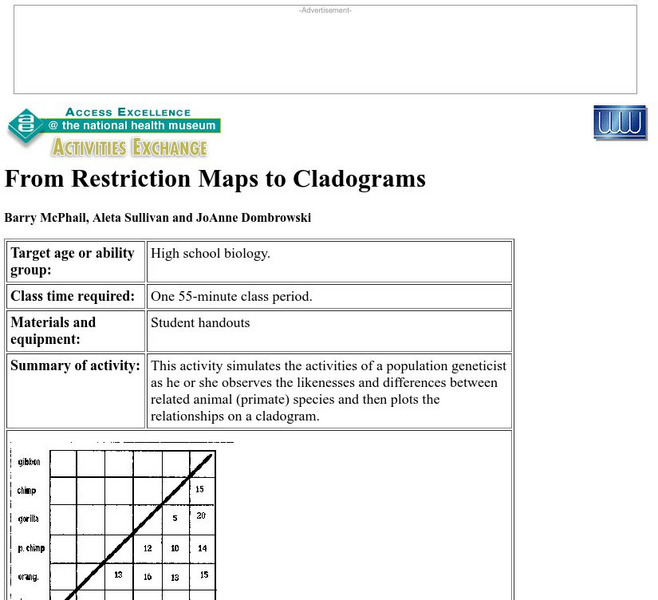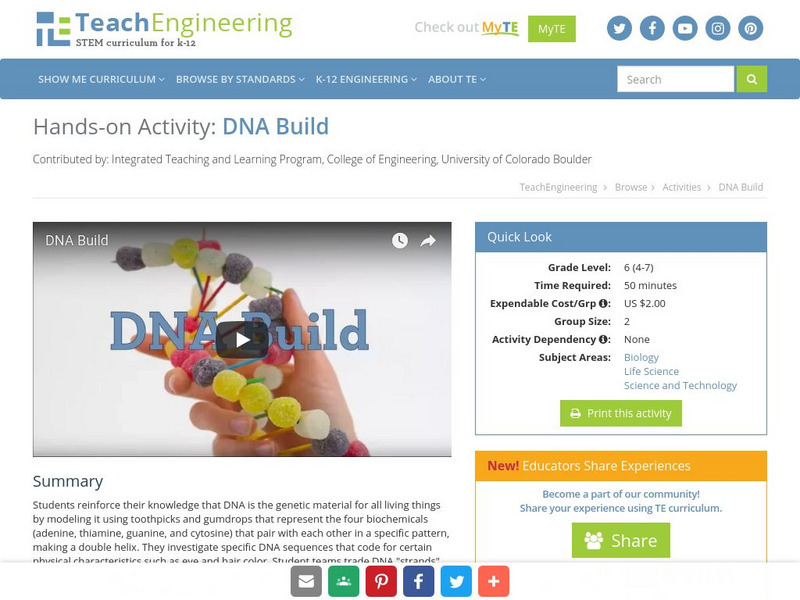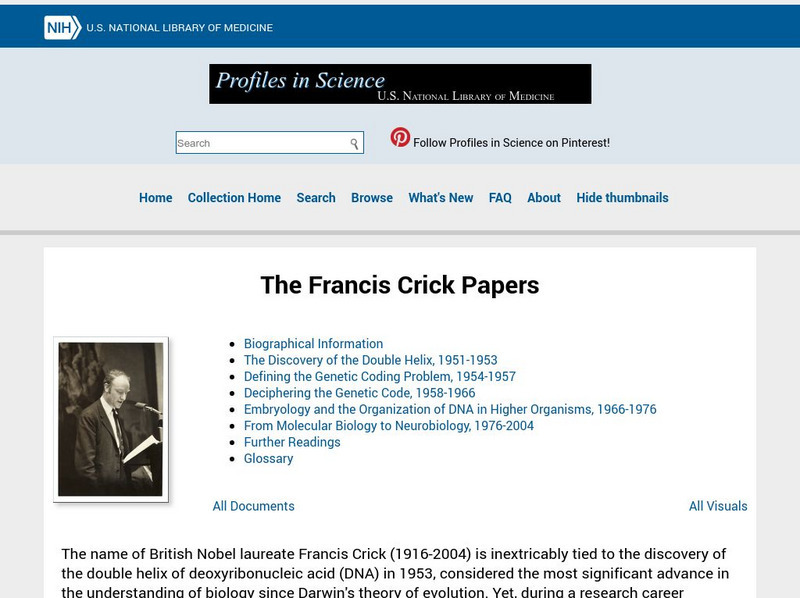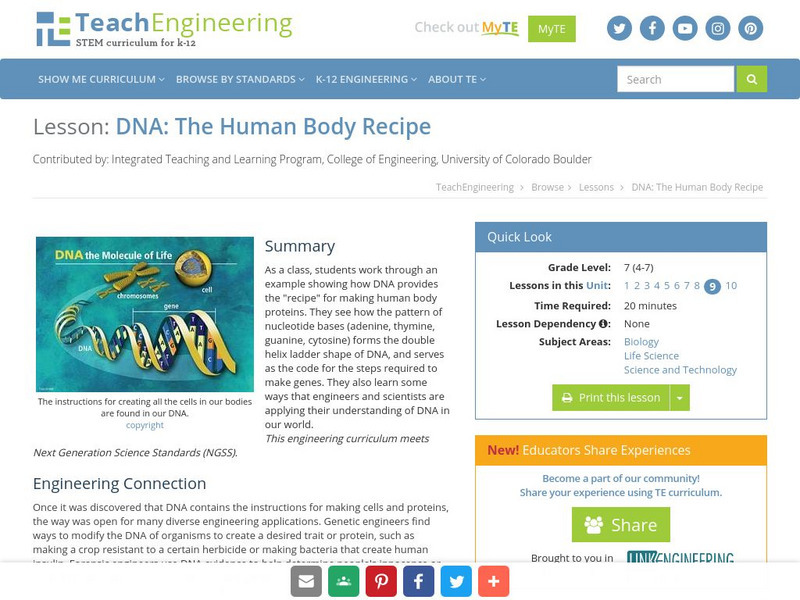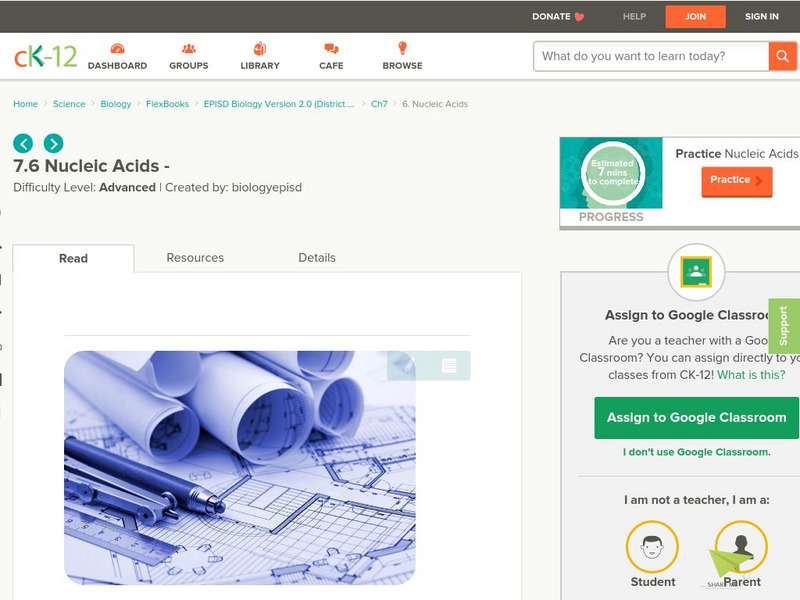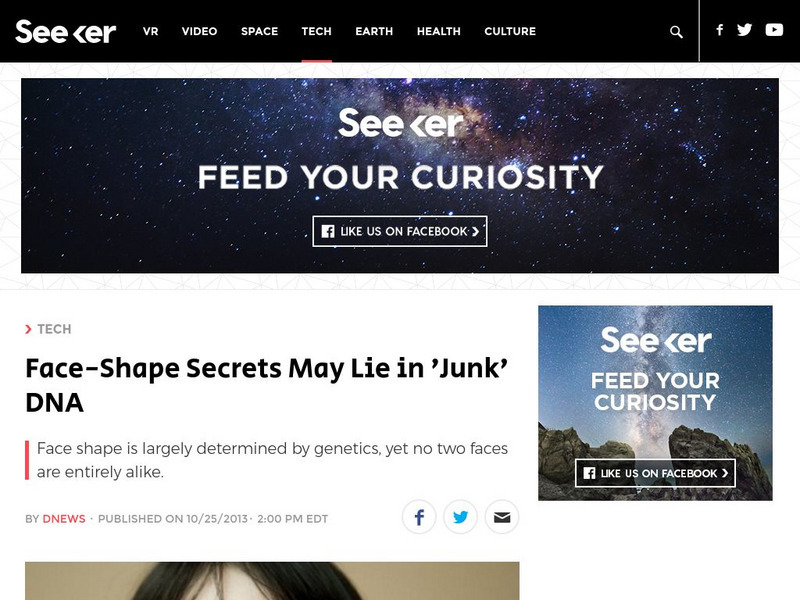National Health Museum
Access Excellence: Molecular Biology/primate Phylogeny
This lesson plan involves comparison of amino acids to create a phylogenetic tree of primates. Young scholars will also use other species information to draw conclusions about evolutionary relationships.
National Health Museum
Nhm: Amino Acid Sequences Show Evolution
This lesson plan focuses on differences in the amino acid sequence of hemoglobin and myoglobin proteins. They use the number of differences to create a phylogenetic tree.
National Health Museum
Nhm: Restriction Maps to Cladograms Lesson
This lesson plan requires young scholars to analyze DNA restriction maps to determine the differences in the sequence for several primates and humans. They then use the information to create a cladogram.
PBS
Pbs Learning Media: Journey Into Dna
Travel deep into the human body to see exactly where your DNA resides. From the NOVA: Cracking the Code of Life Web site.
PBS
Pbs Learning Media: The Sequencing Race Begins
This video segment from NOVA: "Cracking the Code of Life" looks at one of the key players in the race to decode the human genome.
BiologyWise
Biology Wise: Start Codon
A start codon is a nucleotide triplet in a genetic sequence that occurs at the start of a protein's synthesis. Read about how this works and how a mutation can sometimes occur.
TeachEngineering
Teach Engineering: Dna Build
Students reinforce their knowledge that DNA is the genetic material for all living things by modeling it using toothpicks and gumdrops that represent the four biochemicals (adenine, thiamine, guanine, and cytosine) that pair with each...
PBS
Pbs Learning Media: Nature Versus Nurture Revisited
Which dictates our existence? Is it our genetic makeup or the environment we grow up in? Kevin Davies offers an update on this long-standing debate, from the NOVA: "Cracking the Code of Life" Web site.
National Institutes of Health
National Library of Medicine: Profiles in Science: Francis Crick Papers
Biographical information about Francis Crick as well as access to an archival collection of his papers, letters, photographs, and notes, including those related to the discovery of the double helix.
TeachEngineering
Teach Engineering: Dna: The Human Body Recipe
As a class, students work through an example showing how DNA provides the "recipe" for making our body proteins. They see how the pattern of nucleotide bases (adenine, thymine, guanine, cytosine) forms the double helix ladder shape of...
City University of New York
Brooklyn College: Genotype and Phenotype
In this informative site, you will find the definition of genotype and phenotype, an explanation of the relationship between genotype and phenotype, an example of a genetic trait, an explanation of the flow of information from DNA to...
Estrella Mountain Community College
Estrella Mountain Community College: Protein Synthesis
A look at protein synthesis in words and pictures. This website discusses the processes of replication, transcription, and translation. Also covered is Beadle and Tatum research that explains that one gene codes for one polypeptide....
CK-12 Foundation
Ck 12: Life Science: Molecular Evidence for Evolution
[Free Registration/Login may be required to access all resource tools.] Chimpanzees and humans turn out to be very similar - if you look at their DNA. When scientists determined the entire genetic code of both humans and chimpanzees,...
Other
The Human Genome Organisation
This is HUGO's website, it contains vital information on the Human Genome Project.
Cold Spring Harbor Laboratory
Dna Interactive: Genome
This site is provided for by DNA Interactive. The genome is the entire endowment of genetic information. It is the "Book of life," on an organism. This site demonstrates the methods used to map and sequence the human genome and to...
CK-12 Foundation
Ck 12: Plix: Punnett Squares
[Free Registration/Login Required] Use the color coding to help you complete the Punnett Square. You will need a sign-in to help you access this media, but it will be worth your time!
CK-12 Foundation
Ck 12: Life Science: 3.19 Human Genome
See how the human genome project sequenced all 3 billion bases that make up our DNA and identified within this code more than 20,000 human genes.
Nature Research
Scitable: Gene Expression and Regulation
Investigate gene expression with this collection of resources that explains how DNA is expressed to make RNA, how genes are turned "on" and "off", and what must occur for transcription to happen. The webpage explores gene expression by...
CK-12 Foundation
Ck 12: Nucleic Acids
[Free Registration/Login may be required to access all resource tools.] Online activity covers the structure and function of nucleic acids. Students will learn about nucleotides, the different types of nitrogenous bases, and the...
Children's Museum
The Children's Museum of Indianapolis: Dna the Action of Extraction
Students extract DNA from wheat germ to learn about how DNA can easily be found in our food.
Seeker
Seeker: Week of 10 28 13: Face Shape Secrets May Lie in 'Junk' Dna
Article reports that the secret to differences in face-shape may be found in the non-coding sequences of DNA, also known as "junk" DNA.
Oak Ridge National Laboratory
Ornl: Human Genome Project Resources
Many different resources can be accessed through this page from the Oak Ridge National Laboratory. A valuable reference page for teachers and students.
PBS
Pbs Teachers:build a Family Tree (Men Only)
Understand DNA sequences and the Y chromosome. Solve a genealogical puzzle using the power of reasoning and understanding of DNA, and complete the a male family tree using DNA information from the Y chromosome of three fictitious...
Other popular searches
- Cracking the Genetic Code
- Using the Genetic Code
- Genetic Code Proteins
- Genetic Code Sequencing
- Middle School, Genetic Code
- Middle School Genetic Code
- Genetic Code Worksheets
- The Genetic Code



